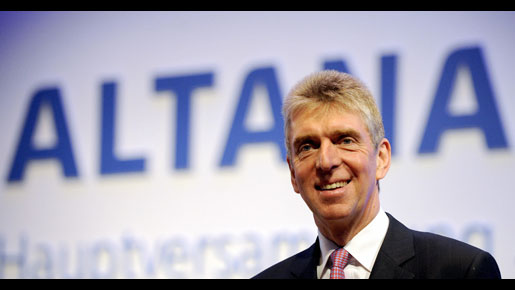
“We have a strong balance sheet. We can make a big acquisition if it meets our criteria,” Matthias Wolfgruber, 54, told Reuters at the company’s headquarters in northwest Germany, where some staff are housed in temporary offices while construction goes on of a new building to accommodate its growing workforce.
Wolfgruber said strategic fit and earnings accretion in the second full year after any deal were among the company’s key acquisition criteria. Helped by a relatively low debt level, he said the company could gear up its balance sheet to up to three times core operating profit and still win an investment-grade rating. The company has no rating but may seek one.
Last year it earned €249m before interest, taxes, depreciation and amortisation. Shares in Altana have lost about a fifth of their value this year, underperforming a seven percent decline in the DJ Stoxx European chemicals index. Last year, the stock rose 26 percent and outpaced the sector’s 20 percent rise.
This year’s decline followed a report last month that the company planned to buy US rival Rockwood Holdings at twice Altana’s market value, sparking jitters among investors who fear a capital-raising share issue.
“Due to the market rumours, we are put on the defensive now,” said Wolfgruber. “But I’m not anxious. I’m confident the share price will swing back to reflect our true value”.
“The comments confirm that activities for acquisition will increase. They have sufficient flexibility to take on more debt,” said Marcus Konstanti, an analyst at Sal. Oppenheim. “With the strong cash flows they have, the dividend could even be higher.”
Altana, controlled by Susanne Klatten of the billionaire Quandt family which also controls BMW AG, has carved out a niche in specialty chemicals whose markets are too small to attract top players such as BASF AG or Dow Chemical Co, but have high growth potential and lucrative margins.
Last year, Altana’s core profit margin was 18 percent, a level many rivals would crave. The company has also been able to pass on higher raw material costs to customers.
In its additives business, tiny quantities are used and account for only a small fraction of production costs. But they are crucial for making paint and plastics as they determine how hard, matt or glossy the products will be.
Altana’s Byk unit is the world’s largest of the €2bn market for coatings and plastics additives. Its other businesses include coatings, pigments and insulation materials.
Chemicals companies have also benefited from an upswing that started in late 2003, piling up cash and fuelling acquisition ambitions. For Altana, profitable growth is a priority, Wolfgruber said. Its dividend payout ratio of 30-40 percent of net profit was reasonable because it left room to fund acquisitions.
“It’s more attractive for our shareholders if we can find attractive targets than to start distributing funds,” said Wolfgruber, who worked for Wacker Chemie in the United States before becoming the chemicals head of Altana in 2002.
“If there is a big project, it will be exciting,” he said. “If we need fresh funds, investors will want to back it”.
But he declined to give details on how close the company was to identifying a target. One sector he ruled out was the so-called wellness industry, which includes skin care products and dietary supplements. “This sector is overcrowded,” he said.

